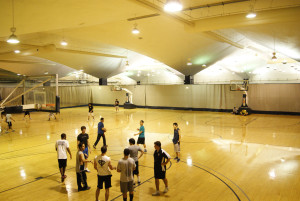This academic year, several new concussion safety programs for club sports have been implemented to better protect student health when dealing with concussions. Katharine Gray, the club sports athletic trainer, has spearheaded these new initiatives since her hiring in March 2014.
Enforcement for baseline tests for members of club sports teams susceptible to concussions have ramped up this year, according to Zachary Moore (MSB ‘16), who plays men’s club soccer.
“This is the second year of the concussion training that Katharine does, but I think there’s more of an emphasis on everyone attending this year,” said Moore.
All players who have had concussions go through concussion protocol, which ensures that a player does not start playing again too quickly after their concussions. After being symptom-free for 24 hours, the player gradually exercises a little more each day until Grey determines that they are ready to return to the field. This test records a player’s cognitive abilities pre-concussion so that Gray is able to determine when a player has returned to full mental health.
Gray also now holds a concussion seminar each semester to inform players about the risks of concussions.
This year, each team’s safety captain acts as an enforcer to make sure every player takes a baseline test and attends a concussion seminar.
Gray requires every player to take these steps because she believes that these new programs have had an impact on informing players of the gravity of ignoring a concussion.
“I think that [the new programs] have helped improve awareness and I think education is one of the biggest things with concussions because it’s important to be aware of the signs and symptoms and of what could happen if you don’t listen to them,” said Gray.
Kenny Lahart (COL ‘16), safety captain of the men’s soccer team, echoed Gray’s sentiment.
“I think [the seminar] is going to raise awareness,” Lahart said. However, Ken O’Brien (COL ‘16) noted that awareness does not necessarily lead to less concussions.
O’Brien, who has had three concussions during his time playing men’s rugby, said, “I probably wouldn’t have gotten less concussions [if I had attended the seminar]. I just would’ve had more knowledge and information.”
However, Moore believes that attendance at the seminar is important. Moore, who got a concussion playing soccer his junior year said, “It’s good for players to sit in on [the seminar]. I think you just have to be safe because it’s a really serious injury.”
Moore, O’Brien, and Lahart all agree that Gray has improved concussion safety and awareness for club sport teams.
“We didn’t have the seminars; we didn’t have the baseline test. We went from nothing to something,” O’Brien said.





